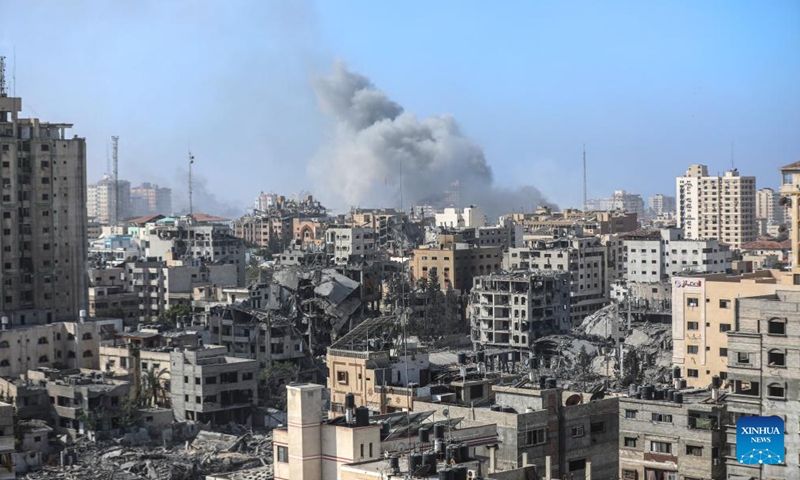
Smoke rises following an Israeli airstrike in Gaza City, on Nov. 9, 2023.(Photo: Xinhua)
After intense US-Israel interactions, Israel has finally agreed to "tactical, localized pauses" in its assaults on the Gaza Strip, but concerns remain among observers, as such pauses could be reversed at any moment and are far from enough to alleviate the humanitarian disaster in the region.
The pauses will be given on three hours' notice and declared "for four hours each day in a different area or neighborhood … to get medical supplies and food" to those in need and allow those who want to leave the intense fighting in northern Gaza to move to the south, according to a senior Israeli official.
The announcement was the result of a weeks-long effort by the Biden administration to get Israeli Prime Minister Benjamin Netanyahu to improve the humanitarian situation in Gaza, as the US itself faces great domestic and international pressure to intervene.
The US national security spokesperson John Kirby described the move as a "significant first step," but Zhu Weilie, director of the Middle East Studies Institute of the Shanghai International Studies University, interpreted it as "Israel's gesture to fudge the US."
The top priority and only solution to the humanitarian crisis in Gaza Strip is a comprehensive ceasefire, to be followed by extensive humanitarian aid and political negotiations on the future of the region, Zhu told the Global Times on Friday. "Daily temporary pauses are not effective in ending the current humanitarian disaster."
Observers are also concerned that the fragile "agreement" could be torn apart at any moment, given the US' declining influence on Israel.
The US is eager to boast about the pause as the international community is watching whether it is Israel listening to the US, or the reverse, Zhu said.
After Kirby's announcement of the pause, Netanyahu's spokesman in Israel initially declined to confirm there had been any agreement at all. Spokesman Elyon Levy declined to address the details Kirby announced and it was only later in the day, at the US' urging, that Israeli officials confirmed them, the Washington Post reported Thursday.
This round of the conflict, which started from October 7, has resulted in nearly 11,000 deaths in the Gaza Strip, and the death toll, according to The Hill, is likely far higher than the number being reported. More than 1,400 were killed on the Israeli side.
In the past few days, tens of thousands of Palestinians, most of them on foot and many with their hands up as they walked by Israeli military vehicles and soldiers, have headed south in a massive exodus. Gun battles can be heard at two major hospitals in the north where numerous Palestinians sought refuge.
However, the disaster was insufficient for the US or the G7 to utter the word "ceasefire."
It again demonstrated that the US does not care about the fate of Palestinians, Zhu said.
The US has entered a peak period in the presidential election campaign, and the Biden administration needs to "do something" to woo Muslim votes. Both the Republican and Democratic parties are using the war to promote election prospects at home, Zhu noted.

